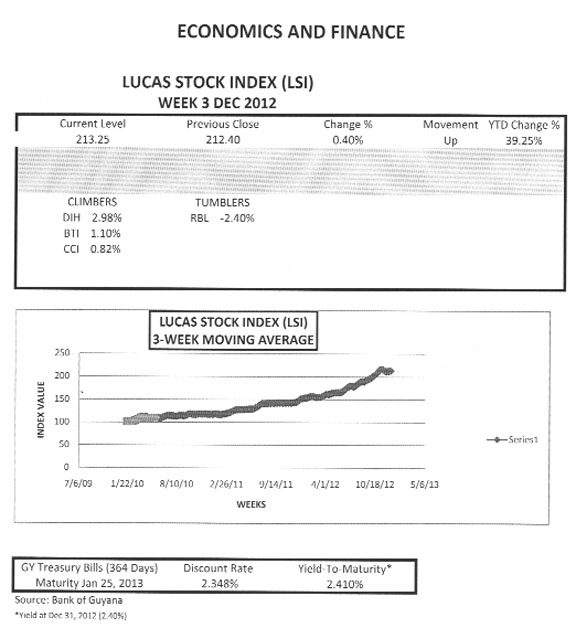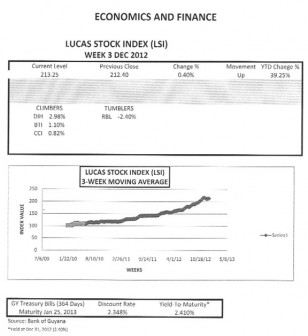Motion
Sir Isaac Newton helped us to gain a better understanding of the world in which we live when he explained what happens to an object that was in motion. His first law of motion stated that an object in motion tends to remain in that state of motion until an external force is applied to it. While Newton was referring to the physical behaviour of inanimate objects, an analogy could be drawn between the behaviour of the PPP/C government and the joint opposition. At the last elections, the PPP/C won 32 seats and the combined opposition won 33 seats, giving the latter a majority in the National Assembly, and depriving the PPP/C of full control of government. For 20 years, the PPP/C administration governed Guyana during which period, it had total control of the executive, legislature and the judiciary, which most Guyanese understood as one-party rule. That situation changed in November 2011 when the opposition came together to control more seats in Parliament than the administration, and in effect, took away control of the legislature from the administration.
Disoriented
In doing so, the opposition became the external force referred to in Newton’s law that has begun to act on the government to compel it to change the way it has governed. The government’s motion towards perpetual one-party rule was altered in 2012 by the application of the force from the parliamentary majority reflected, among others, in the latter’s scrutiny and downsizing of the administration’s budget proposal, rejection of some of its request for supplementary resources without proper justification, and challenge to the conduct and competence of some of its officials in the line of duty. Unable to control its motion as it once did when the opposition challenged it previously, the administration seems disoriented and is swerving on and off a path of unrestrained spending to which it has kept trying to return during the course of the year. Instead of taking the opportunity to demonstrate to Guyanese that there was a different way of governing and it knew how following the results of the elections, the administration kept trying to get back on the same path of unbridled spending that it enjoyed under one-party rule.
LUCAS STOCK INDEX
The Lucas Stock Index (LSI) recorded a gain of 0.40 percent in the third week of trading in the month of December 2012. The increase came from positive movement in the stocks of Banks DIH (DIH) which rose 2.98 percent, Guyana Bank for Trade and Industry (BTI) that rose 1.10 percent and Caribbean Container Inc (CCI) that rose 0.82 percent. The stocks of Republic Bank Limited declined 2.4 percent while those of Demerara Bank Limited (DBL) remained unchanged. The positive movement in the stock prices pushed the LSI closer to a 40 percentage point advantage over the yield of the 364-day Treasury Bills with a December expiration date.
Opportunity for a Fresh Start
After the elections over a year ago, the way forward might not have been clear, but an opportunity for a fresh start existed. Guyana was at a crossroads. Everyone was hopeful that the ruling party which retained executive power would try to clean up the environment in and around it. Accusations of corruption and mismanagement were plentiful. The reports of the Auditor-General were replete with examples of questionable procurement, management and accounting practices. Some optimism that the new administration understood that Guyana had an opportunity to reconstitute its morality began to emerge when the ill-fated Amaila Falls road contract was taken away from an undeserving contractor shortly after the elections. Understanding that the behemoth, which the PPP/C administration had become, would need time to alter course, Guyanese waited for change with keen anticipation throughout 2012. Their expectations were heightened during the budget debate when it was revealed that the Public Procurement Commission (PPC) would be established by the end of June 2012. The administration also conceded that the office of the Auditor-General should function autonomously and took the necessary steps to so position it before Parliament had the chance to force its hand.
The administration of the PPP/C looked reasonable despite its dissatisfaction with the apportionment of parliamentary responsibilities and control in the 10th Parliament which had occurred early in the year. The steps were tentative and looked different from the past. A fresh start with more strident footsteps seemed possible and the political leadership of the country appeared to be calibrating its relationship with the electoral statement made at the polls in November 2011. The administration and the joint opposition had agreed on a menu of items and a forum for discussing the various items. The opposition had called for changes in the value-added tax, the liberalization of NCN, the establishment of the PPC, transparency regarding NICIL and constitutional reform.
Good intentions
As is often said, the road to hell is paved with good intentions. Change has risks and uncertain economic and social consequences. Hopes were raised when evidence of fraud was uncovered at NCN and then dashed when the administration received the report containing the evidence and took no further action than suspending or relieving persons of their duty. Further frustrations emerged with the refusal to make full disclosures about the activities of NICIL, the sale of GT&T shares and to deal with cases of apparent conflict of interest in the administration. The year 2012 is about to end and the optimism about change which surfaced at its dawn has dimmed and is slowly beginning to fade away like the setting sun.
Managerial and operational limitations
An economy that clearly has the ability and capacity to do better than it has is being restrained by political gridlock. Managerial and operational limitations are being exacerbated by this impasse. The way that the PPP/C administration is behaving suggests that it thinks that the Guyanese people are questioning its legitimacy because of its minority status. Also, it seems to think that the opposition is challenging its authority by exercising the power it has in the legislature.
The perception of this relationship troubles many in Guyana, and the continuous bombardment of the courts for a judicial solution to political problems is not helping. Yet, it must be kept in mind that the role of the opposition, though always clearly defined, was never easy to discharge since all decision-making power was concentrated previously in the hands of the executive. Now the story is different and the executive and the legislature must each act with an eye to obtaining the support of the other in the management of the affairs of the nation. Unfortunately, what seemed like a real opportunity for change is being treated now like a humbug.
Dialogue, if not missing, is ineffective. Neither inside nor outside the National Assembly is the dialogue useful. Each force has equal and countervailing weight and there is far too much unwillingness to compromise. In addition to the endless approaches to the judiciary, there is the most recent set of complaints sent by both the opposition and the administration to members of the international community. Apparently, it has not dawned on anyone that more could be achieved by working together instead of trying to go it alone. That the opposition and the government sought help from outside, Guyanese must wonder how it is that domestic institutions set up to facilitate dialogue and action are proving inadequate to the task. It cannot solely be about the mechanisms; it must also be about the participants. The legislative impasse is quite like the tragedy of the commons where everyone’s benefits are reduced to zero simply from selfishness.
Private sector
Concern about the zero-sum game has been expressed repeatedly by the private sector during the course of the year, and one can understand the reason. The opportunity to fashion effective business incentives, develop and attract high quality skills and elevate the integrity and accountability of public institutions is being squandered. The leadership on these matters should be coming from both the opposition and the administration, but other parts of civil society need to make their contribution as well. That is why the recent decision of the private sector to reject the administration’s suggestions for strengthening the National Insurance Scheme is commendable. The private sector has also decided to examine the issue of the tax rates aware that the administration has failed to move forward on the issue notwithstanding a declaration to do so. That the private sector has pushed back against the executive is also an indication that it appreciates the improvements in the checks and balances that now exist in the country. Affected by all that is taking place, the private sector appears to recognize that it is the well-being of Guyanese, not the self-interest of any political party that matters and is at risk.
Commonsense and common interest
No one expects the political parties to agree on everything that each side proposes, but Guyanese expect that the parties will use commonsense and common interest to overcome their differences. That is not happening with the result that economic progress is being jeopardized and social problems are being magnified and multiplied. In nature, forces of friction and gravity act upon our motion all the time. Yet, as humans we have found ways to defy them. Our political leaders need to do the same and find reasonable ways to resolve the competing interests of Guyanese. The Christmas season brings peace and a renewal of hope. That needs to happen with the politics as well.
Merry Christmas!











